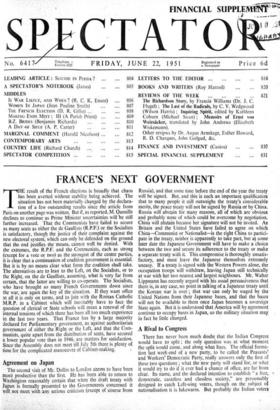FRANCE'S NEXT GOVERNMENT
THE result of the French elections is broadly that chaos has been averted without stability being achieved. The situation has not been materially changed by the declara- tion of a few outstanding results since the article from Paris on another page was written. But if, as reported, M. Queuille declines to continue as Prime Minister uncertainties will be still further increased. That the Communists have failed to secure as many seats as either the de Gaullists (R.P.F.) or the Socialists is satisfactory, though the justice of their complaint against the new electoral system, which can only be defended on the ground that the end justifies the 'means, cannot well be denied. With the extremes, the R.P.F. and the Communists, each as strong (except for a vote or two) as the strongest of the centre parties, it is clear that a continuation of coalition government is essential. But it is by no means clear what form the coalition shall take. The alternatives are to lean to the Left, on the Socialists, or to the Right, on the de Gaullists, assuming, what is very far from certain, that the latter are willing to co-operate. The Socialists, who have brought so many French Governments down since the war, arc again the key of the situation. If they want office at all it is only on terms, and to join with the Roman Catholic M.R.P. in a Cabinet which will inevitably have to face the question of clerical or State schools will mean a renewal of the internal tensions of which there has been all too much experience in the last two years. That France has by a large majority declared for Parliamentary government, as against authoritarian government of either the Right or the Left, and that the Com- munists, quite apart from the distribution of seats, have secured a lower popular vote than in 1946. are matters for satisfaction. Since the Assembly does not meet till July 5th there is plenty of time for the complicated manoeuvre of Cabinet-making.


















































